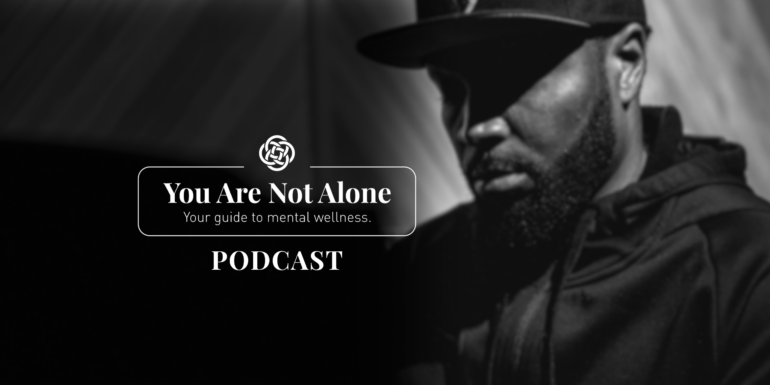Out of a commitment to educating the Black and African American communities about mental health and wellness and normalizing conversations about mental health, KJLH Los Angeles presents the podcast “You Are Not Alone: Your Guide to Mental Wellness,” produced by The Chicago School.*
The series explores mental health and wellness issues that impact listeners and searches for ways to improve their wellness. Every week mental and behavioral health experts from The Chicago School and other professional organizations will share their experience and expertise to guide listeners on their journey to good health and satisfying lives.
The scope of the challenge
Mental health services fail Black men in America for a number of reasons, including cultural differences, socioeconomic issues, and structural racism. The statistics paint a clear picture. While all Americans suffer mental illness at about the same rates, roughly 26% of Black and Latino men ages 18 to 44 sought mental health services for anxiety and depression as compared to about 45% of white men in the same category, according to a survey by the National Center for Health Statistics. Additionally, Black men who may prefer to speak to a Black psychologist will have a difficult time finding a provider, given that Black psychologists comprise only 4% of the doctoral-level workforce.
An unequal landscape
Unsurprisingly, poverty is also a major contributor to emotional distress. According to the U.S. Department of Health and Human Services’ Office of Minority Health, Black adults living below the poverty line are more than twice as likely to report serious psychological issues as do Americans with greater financial security. This reality is made worse by the fact that individuals living in poverty are less likely to receive preventative services and more likely to rely on emergency rooms for primary care.
On top of economic factors, the mental health of Black men is uniquely hindered by historical trauma and structural racism, which is manifested in implicit bias, high poverty rates, a lack of access to services, and a history of being underrepresented in mental health research.
The need to give voice to solutions
With these factors in mind and the need for a positive response a national imperative, The Chicago School and KJLH hope to highlight mental health challenges in the Black community and to come together in search of positive outcomes. The podcast series will focus upon a range of issues pertaining to mental health in the Black community and will feature leading professionals who specialize in those aspects of psychology that are unique to this population.
A preview of what’s to come
The first episode, “Mental Health in the Black Community,” examines how the historical dehumanization and oppression of Black people has evolved into present day structural, institutional, and individual racism. Panelist Alixis S. Rhodes, Ph.D., is a graduate of Psy.D. Applied Clinical Psychology program at The Chicago School, and is a liberation psychologist who has traveled to more than 33 countries. She is one of the founders of No Black Girl Left Behind (NBGLB).
Staci Atkins, Psy.D., is a graduate of The Chicago School and a psychologist and a Licensed Clinical Social Worker in the Los Angeles area. She also has a private therapy practice in the West Los Angeles area where her clinical focus includes trauma-informed care, women’s health, and psychoeducational testing.
The second episode, “Black Men & Mental Health,” addresses the issues discussed in this article from the perspective of Black mental health professionals who experience the effects of these adverse factors firsthand. Panelist Javis Sams, AMFT, is an alumnus of The Chicago School and a therapist based in Southern California who specializes in working with communities of color, particularly Black men. “As a man of color, I appreciate how important it is to meet men where they are,” Sams says. “It is my hope that clients from underrepresented and underserved communities will see me as especially ready for that task.”
Also a panelist on the inaugural episode is TrayVonne McVay, Ph.D., a graduate of The Chicago School with a degree in applied clinical psychology. His concerns about over-medication of people seeking mental health care inspired him to pursue postdoctoral work in clinical psychopharmacology. Dr. McVay has a wealth of knowledge of evidence-based treatment modalities. He specializes in cognitive behavior therapy, trauma-informed care, applied behavior analysis, and dialectical behavior therapy. He also incorporates faith-based therapy into his treatment.
Subsequent episodes will focus on Black women and mental health; supporting Black leadership; and Black wellness and the power of self-help. Listen below and subscribe.
Or, watch the first episode and subscribe to our YouTube channel.
*The Chicago School and KJLH Los Angeles provide these podcasts only for educational and informational purposes. This podcast is not intended as, or should not be understood as, mental or behavioral therapeutic advice. The information we share is not a substitute for mental or behavioral health guidance from a professional. If you need mental or behavioral help, we urge you to seek professional guidance and support. The opinions expressed by our guests or host do not necessarily reflect the views of KJLH Los Angeles or The Chicago School. The Chicago School or KJLH Los Angeles are not responsible for the consequences of any actions based on information or resources provided in these programs. The Chicago School and KJLH Los Angeles disclaim any liability related to any podcast content.

